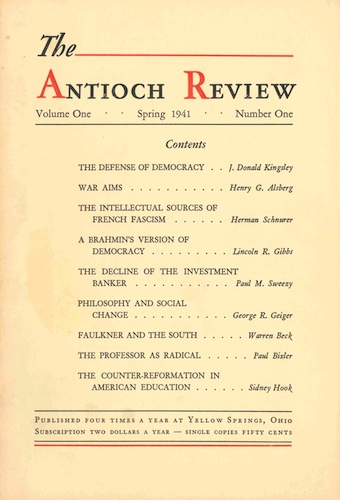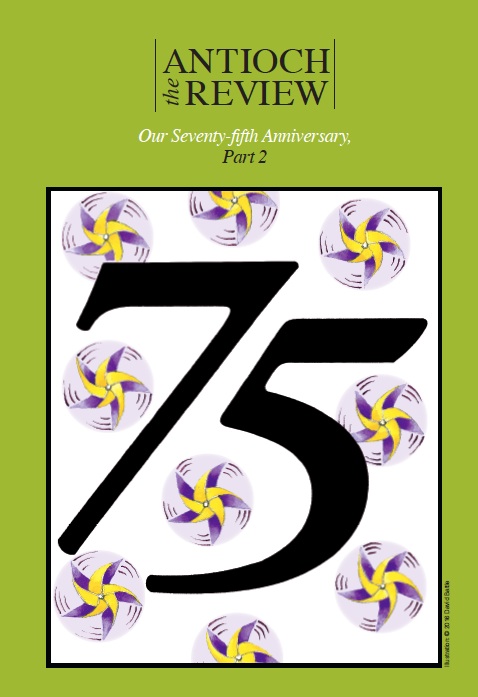Antioch Review 74/4 -75/1 Fall 2016 Winter 2017
| Weight | 0.815000 |
|---|---|
| Binding | Magazine |
| Pages | 190 |
| Date Published | 2017-03-09 00:00:00 |
| Frequency | Quarterly |
|---|---|
| ISBN13/Barcode | 9770003576994 |
| Publisher | Antioch Review |
Publishing the Best Words in the Best Order
For 75 Years
 In 1940, a small group of Antioch College faculty met to discuss the founding of a review. Faced with a world wherein fascism and communism were on the march, they sought to establish a political forum from which the voice of liberalism could be heard.
In 1940, a small group of Antioch College faculty met to discuss the founding of a review. Faced with a world wherein fascism and communism were on the march, they sought to establish a political forum from which the voice of liberalism could be heard.
In 1941 they launched the first number of the Antioch Review and in their statement of purpose gave voice to their political and social concerns. Their first editorial stated:
It takes, perhaps, uncommon brashness to plunge into the intellectual struggle at a time which Max Lerner has so aptly described as that of “the breaking of nations.” When values are everywhere toppling in the high winds of conflicting dogmas, there are those who would seek refuge in a quiet cloister or an ivory tower. Such an escape is not unattractive; it is impossible. No intellectual, almost by definition, can be indifferent today to the social struggle or to the blackout of learning, literature, and the arts which accompanies defeat in that struggle. If the march of fascism has demonstrated nothing else it is that the scholar is not above society, but is inextricably intertwined in its meshes. The destruction of democracy commences with the erosion of the intellectual classes.
The battle for a humanistic social order is, therefore, a matter of prime importance to all intellectuals. Their very existence depends upon victory in that struggle. Yet the argument cannot be allowed to rest on this level of naked self-interest. There are other stakes as well: basic values more precious even than life itself. There is the profound belief in the common man, without which humanism is inconceivable. There is the conception, now heretical over most of the world, that men should be viewed as ends and not as means. There is the revolutionary idea that the social order exists for the furtherance of human welfare, rather than for the glorification of a narrow class. There are a few of the stakes in the gigantic power struggle that is the world’s disease. Civilization today is being challenged in a civil war of unexampled magnitude; a civil war of which the present European conflict is merely one expression. What is at stake is the whole complex of values so painfully wrought in the years since the Enlightenment.
For the intellectual to maintain a lofty “objectivity” at such a time is not merely to commit suicide. If no more were involved than the self-destruction of a handful of ineffectuals, others would have little basis for complaints. But the consequences are more serious than this. We are confronted with a situation in which to be silent is to play the midwife at the birth of another Dark Age. The alternatives are clear-cut and unavoidable. He who does not now speak out assists in the degradation of the democratic doctrine as surely as the outright exponent of totalitarianism.
 We do not propose to remain silent and it is our purpose to provide a forum for others who feel as we do. We believe in democracy, so strongly that we think it should be enormously extended. We believe that no scholar can fail to view with concerns threats against basic human values, whether they originate inside of outside the country. We believe in an instrumental theory of knowledge and in the application of scholarship to the solution of social problems. We believe that the social role of the intellectual in our time is to employ ideas to further democracy in the fullest sense. We believe in the promise of American life and we would seek for the seeds of that promise. This is our propose in founding a magazine.
We do not propose to remain silent and it is our purpose to provide a forum for others who feel as we do. We believe in democracy, so strongly that we think it should be enormously extended. We believe that no scholar can fail to view with concerns threats against basic human values, whether they originate inside of outside the country. We believe in an instrumental theory of knowledge and in the application of scholarship to the solution of social problems. We believe that the social role of the intellectual in our time is to employ ideas to further democracy in the fullest sense. We believe in the promise of American life and we would seek for the seeds of that promise. This is our propose in founding a magazine.
Nineteen forty-one was both a dividing point for the dominant issues and trends of the twentieth century and the beginning of a literary, intellectual, or little (you take your pick) magazine that they hardly could have expected to last out the war. But it did.
Seventy-five years later, we are celebrating our 75th Anniversary of connecting literary writers to a culture of engaged readers. Our audience is made up of educated citizens, often professional people, who are interested in matters beyond their fields of special activity as well as the novice, many of whom will one day become respected experts like others who have penned pages or been highlighted over the years such as those included in Part I and Part 2 of our anniversary issues.
Learn more: http://review.antiochcollege.edu/
